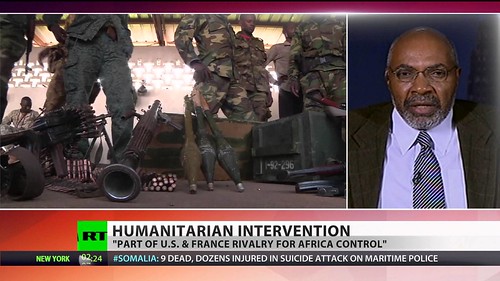
Abayomi Azikiwe, editor of the Pan-African News Wire, on RT worldwide satellite television news on December 5, 2013. He discussed the French intervention in the CAR., a photo by Pan-African News Wire File Photos on Flickr.
Pentagon Assists French Imperialists in the Central African Republic
Paris seeks to deepen its military presence in former colony
By Abayomi Azikiwe
Editor, Pan-African News Wire
United States Secretary of Defense Chuck Hagel has ordered the Pentagon to assist France in its military build-up in the Central African Republic (CAR). The decision was reportedly made after French Defense Minister Yves Le Drian met with Hagel in Kabul, Afghanistan on December 8.
With the backing of the United Nations Security Council, the government of Francois Hollande has more than doubled the French military presence in the CAR. Approximately 1,600 troops are now establishing their authority at the airport outside Bangui, the capital, while the U.S. has agreed to help transport French troops into the country.
In a statement issued by President Barack Obama’s Assistant Press Secretary Carl Wood it said that "Minister Le Drian requested limited assistance from the United States military to support this international effort. In response to this request, Secretary Hagel has directed the U.S. Africa Command (AFRICOM) to begin transporting forces from Burundi to the Central African Republic, in coordination with France."(December 9)
This same statement went on to say "The United States is joining the international community in this effort because of our belief that immediate action is required to avert a humanitarian and human rights catastrophe in the Central African Republic, and because of our interest in peace and security in the region. We continue to work to identify additional resources that might be available to help address further requests for assistance to support the international community's efforts in CAR."
The Central African Republic is a former French colony where Paris already had over 600 troops. Earlier this year in March, an alliance of four rebel organizations known as Seleka seized power forcing the former President Francois Bozize to flee the capital of Bangui.
An interim President Michel Djotodia assumed control of the government of the CAR after Seleka rebels took the capital. Djotodia is Muslim as is many of the Seleka fighters and this factor is being utilized by the French and U.S. governments to provide a rationale for intervention even though the rebels have not been accused publicly of having any real connections to political Islam. Muslims constitute 15 percent of the population in the CAR.
Le Drian issued a warning to the people of the CAR saying that "First we'll ask gently and if they don't react, we'll do it by force. The operation will take some time. The period of impunity is at an end.” (BBC World Service, December 9)
Djotodia has requested that the Seleka forces remain in their barracks while the French and allied African troops take up their positions around Bangui. He has also been quoted as saying that he has very little control of the operations of the rebels and is in favor of a political settlement to the conflict.
Clashes between the Seleka forces and the French military have already occurred near the airport outside Bangui. France has announced that it is currently seeking to disarm Seleka and establish its firm control over the capital and other areas throughout the country.
A spokesman for the Seleka fighters has claimed that they are the rightful leaders of the CAR during this period. The commander of their forces in Bossangoa, north of the capital of Bangui, where two days of violent clashes have reportedly taken place, Colonel Saleh Zabadi, is saying that Muslims are being burned to death by Christian militias.
"This is targeting of Muslims," Zabadi said. "They want the current (Muslim) president to step down or else they will keep slaughtering our people."(CNN, December 9)
France, U.S. Escalates Military Involvement in Africa
Both France and the U.S. have dispatched troops into various African states over the last year. In Mali during January, France staged a major invasion and occupation of another one of its former colonies under the guise of halting an incursion by Islamic-oriented armed groups in the northern and central regions of the vast mineral-rich state.
The U.S. also assisted in the intervention by Paris in January by transporting troops into the field of battle. Prior to the large-scale French intervention in January, the U.S. had established training and assistance programs with the Malian government through AFRICOM.
Capt. Amadou Sanogo, the leader of the March 2012 military coup in Mali, was trained in several military academies in the U.S. The role of the Pentagon in their purported assistance programs with Mali only served to weaken the West African state’s capacity to handle its own internal affairs stemming from the divisions between the Tuareg people of the North of Mali and the southern capital of Bamako that originated during the colonial era.
Both France and the U.S. have also collaborated in the massive bombing and war of regime-change in Libya during 2011 and in attempts to subdue and contain the Al-Shabaab resistance forces opposing the Washington and European Union supported Somalian federal government. In Niger, another former French colony rich in uranium resources, both the U.S. and Paris have troops stationed in the country where drone stations are being built in order to protect the strategic resources of the state.
In the Central African Republic there are significant deposits of gold, diamonds and uranium as also exists in Mali and Niger. Both the U.S. and France have economic interests inside the country.
These interventions in Africa are not for humanitarian purposes but are clearly designed to enhance the economic interests of France and the U.S. in Africa. Until Africa breaks with imperialism and forms its own independent continental military force that can address internal political and security issues, the invasions, occupations and other forms of destabilization will continue throughout the region.
No comments:
Post a Comment